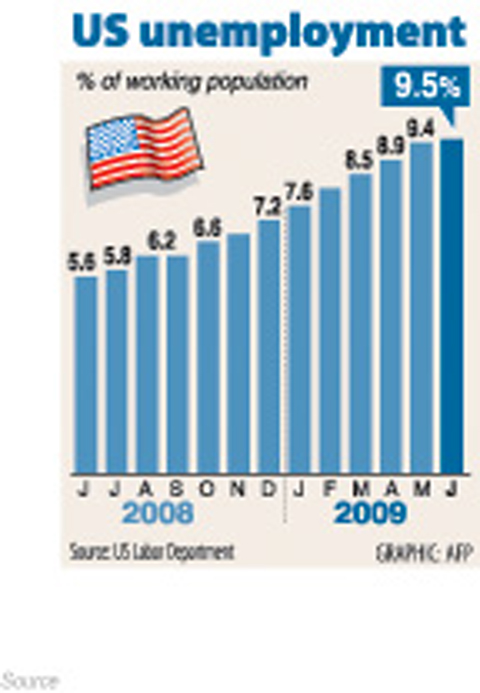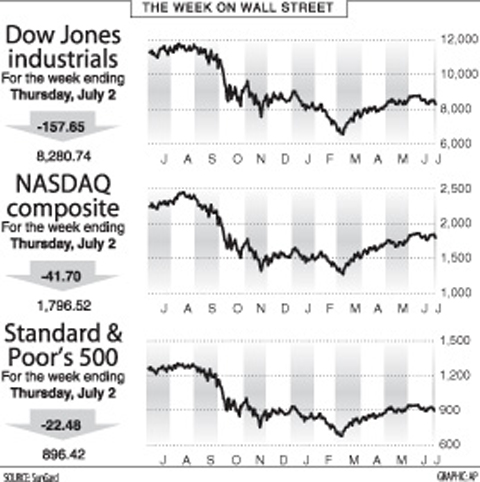Wall Street’s hopes for a rapid recovery from recession, muddled by disappointing US labor market data, faces a new test in the coming week with the looming corporate earnings season.
The market was hammered by news of steeper-than-expected US job losses in the past month, which dampened hopes of a quick recovery, putting the earnings season in the spotlight for investors. In the holiday-shortened week to Thursday, the Dow Jones Industrial Average slumped 1.87 percent to 8,280.74, a third consecutive loss for blue-chips.
The broad-market Standard & Poor’s 500 index slumped for a third week, losing 2.45 percent to 896.42, while the technology-heavy NASDAQ lost 2.27 percent over the four-day week to 1,796.52.

The market had been on a positive track for the week until Thursday’s shock data showed a disappointing 467,000 jobs lost last month — far worse than expected and a reversal of the improving trend from May.
The report dashed hopes that had been growing for an early recover to the recession that has gripped the world’s biggest economy since December 2007.
“For all the talk of an impending US economic recovery, June’s worse than expected nonfarm payroll report highlights that the current recession lives on,” said Meny Grauman, an economist at CIBC World Markets.

“The outlook for the US economy remains decidedly negative despite a slew of better than expected economic data. Not only are monthly payroll declines still in the triple digits, but earnings are growing very slowly, and hours worked are being cut back,” Grauman said.
Grauman said the weakness in the job market will hurt incomes, leading to sluggish spending and overall economic activity.
Others say a single report should not detract from what appears to be a stabilization in the economy, highlighted by improving trends in manufacturing and spending.
“We need to take stock for a minute and ask whether this was a reversal in the downward trend in payroll losses or just a hiccup in the process of stabilizing the job market,” Joel Naroff at Naroff Economic Advisors said.
“I have always argued that one month a trend does not make and that is the case with this data. But the employment reductions have to slow soon if the economy is to start to rebound,” Naroff said.
Philip Orlando at Federated Investors said the data “clearly was a step in the wrong direction for the recovery of both the economy in general and the employment market in particular.
“We continue to believe that January 2009 remains the trough of the current jobs cycle,” with a loss of 741,000 jobs, Orlando said. “We are also sticking to our controversial, out-of-consensus belief that the economy likely bottomed during the just-completed second quarter, and we are still forecasting a resumption of positive gross domestic product growth in the second half of calendar 2009. But today’s jobs report was undoubtedly a black eye for our forecast.”
Bonds ended the week mixed. The yield on the 10-year Treasury note fell to 3.495 percent from 3.506 percent a week earlier and that on the 30-year bond edged up to 4.317 percent from 4.303 percent. Bond yields and prices move in opposite directions.
The coming week sees the first of the blue-chips, Alcoa, reporting earnings on Tuesday, and a survey on the US services sector from the Institute of Supply Management.

MORE VISITORS: The Tourism Administration said that it is seeing positive prospects in its efforts to expand the tourism market in North America and Europe Taiwan has been ranked as the cheapest place in the world to travel to this year, based on a list recommended by NerdWallet. The San Francisco-based personal finance company said that Taiwan topped the list of 16 nations it chose for budget travelers because US tourists do not need visas and travelers can easily have a good meal for less than US$10. A bus ride in Taipei costs just under US$0.50, while subway rides start at US$0.60, the firm said, adding that public transportation in Taiwan is easy to navigate. The firm also called Taiwan a “food lover’s paradise,” citing inexpensive breakfast stalls

TRADE: A mandatory declaration of origin for manufactured goods bound for the US is to take effect on May 7 to block China from exploiting Taiwan’s trade channels All products manufactured in Taiwan and exported to the US must include a signed declaration of origin starting on May 7, the Bureau of Foreign Trade announced yesterday. US President Donald Trump on April 2 imposed a 32 percent tariff on imports from Taiwan, but one week later announced a 90-day pause on its implementation. However, a universal 10 percent tariff was immediately applied to most imports from around the world. On April 12, the Trump administration further exempted computers, smartphones and semiconductors from the new tariffs. In response, President William Lai’s (賴清德) administration has introduced a series of countermeasures to support affected

CROSS-STRAIT: The vast majority of Taiwanese support maintaining the ‘status quo,’ while concern is rising about Beijing’s influence operations More than eight out of 10 Taiwanese reject Beijing’s “one country, two systems” framework for cross-strait relations, according to a survey released by the Mainland Affairs Council (MAC) on Thursday. The MAC’s latest quarterly survey found that 84.4 percent of respondents opposed Beijing’s “one country, two systems” formula for handling cross-strait relations — a figure consistent with past polling. Over the past three years, opposition to the framework has remained high, ranging from a low of 83.6 percent in April 2023 to a peak of 89.6 percent in April last year. In the most recent poll, 82.5 percent also rejected China’s

PLUGGING HOLES: The amendments would bring the legislation in line with systems found in other countries such as Japan and the US, Legislator Chen Kuan-ting said Democratic Progressive Party (DPP) Legislator Chen Kuan-ting (陳冠廷) has proposed amending national security legislation amid a spate of espionage cases. Potential gaps in security vetting procedures for personnel with access to sensitive information prompted him to propose the amendments, which would introduce changes to Article 14 of the Classified National Security Information Protection Act (國家機密保護法), Chen said yesterday. The proposal, which aims to enhance interagency vetting procedures and reduce the risk of classified information leaks, would establish a comprehensive security clearance system in Taiwan, he said. The amendment would require character and loyalty checks for civil servants and intelligence personnel prior to